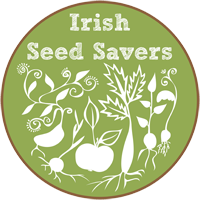-
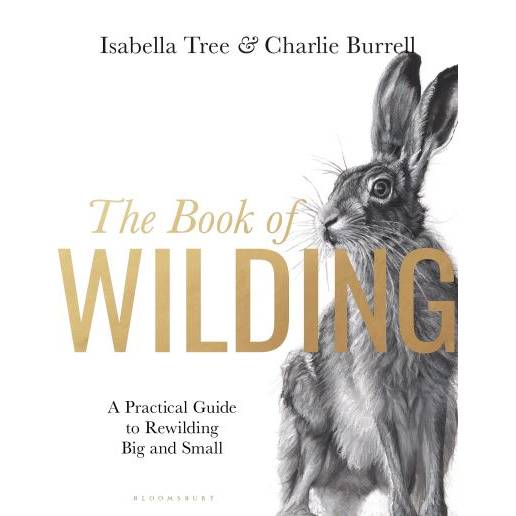 The enormity of climate change and biodiversity loss can leave us feeling overwhelmed. How can an individual ever make a difference? Isabella Tree and Charlie Burrell know first-hand how spectacularly nature can bounce back if you give it the chance. And what comes is not just wildlife in super-abundance, but solutions to the other environmental crises we face. The Book of Wilding is a handbook for how we can all help restore nature. It is ambitious, visionary and pragmatic. The book has grown out of Isabella and Charlie's mission to help rewild Britain, Europe and the rest of the world by sharing knowledge from their pioneering project at Knepp in Sussex. It is inspired by the requests they receive from people wanting to learn how to rewild everything from unprofitable farms, landed estates and rivers, to ponds, allotments, churchyards, urban parks, gardens, window boxes and public spaces.. The Book of Wilding has the answers. 'Brilliantly readable and incredibly hard-working' - HUGH FEARNLEY-WHITTINGSTALL 'A deep, dazzling and indispensable guide to the most important task of all: the restoration of the living planet' - GEORGE MONBIOT Important and empowering' - BENEDICT CUMBERBATCH 'Get this great guide and be inspired' - STEPHEN FRY 'A handbook of hope ... Buy it, read it, start changing things right now' - JOANNA LUMLEY
The enormity of climate change and biodiversity loss can leave us feeling overwhelmed. How can an individual ever make a difference? Isabella Tree and Charlie Burrell know first-hand how spectacularly nature can bounce back if you give it the chance. And what comes is not just wildlife in super-abundance, but solutions to the other environmental crises we face. The Book of Wilding is a handbook for how we can all help restore nature. It is ambitious, visionary and pragmatic. The book has grown out of Isabella and Charlie's mission to help rewild Britain, Europe and the rest of the world by sharing knowledge from their pioneering project at Knepp in Sussex. It is inspired by the requests they receive from people wanting to learn how to rewild everything from unprofitable farms, landed estates and rivers, to ponds, allotments, churchyards, urban parks, gardens, window boxes and public spaces.. The Book of Wilding has the answers. 'Brilliantly readable and incredibly hard-working' - HUGH FEARNLEY-WHITTINGSTALL 'A deep, dazzling and indispensable guide to the most important task of all: the restoration of the living planet' - GEORGE MONBIOT Important and empowering' - BENEDICT CUMBERBATCH 'Get this great guide and be inspired' - STEPHEN FRY 'A handbook of hope ... Buy it, read it, start changing things right now' - JOANNA LUMLEY -
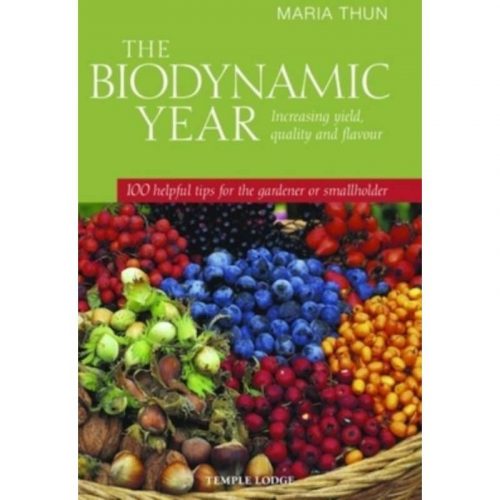
-
Coming Soon
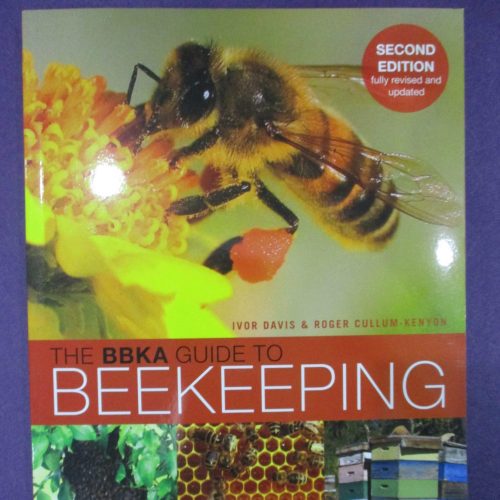
-
Coming Soon
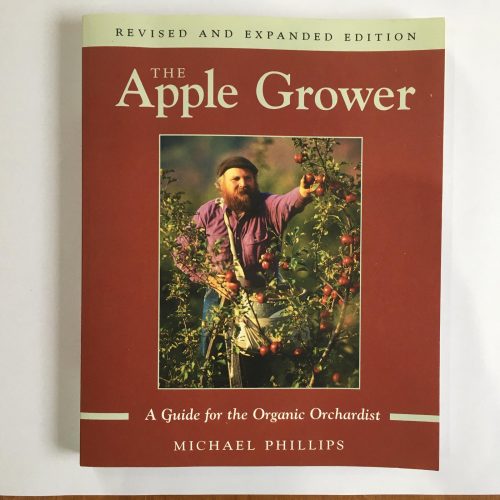 Widely acclaimed as the gold standard for anyone that is interested in growing apple trees wisely and naturally. This is the new and expanded edition covering topics such as growing apples for your local region, orchard maintenance and harvesting.
Widely acclaimed as the gold standard for anyone that is interested in growing apple trees wisely and naturally. This is the new and expanded edition covering topics such as growing apples for your local region, orchard maintenance and harvesting. -
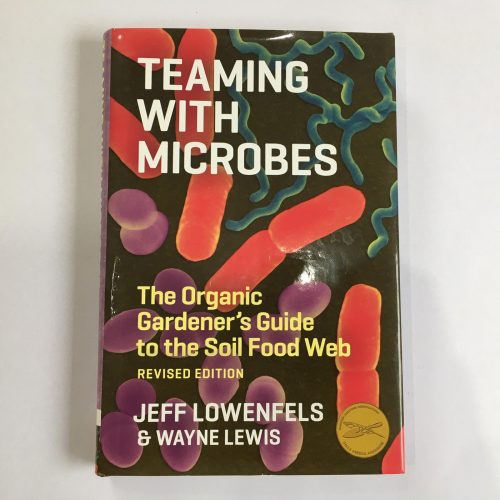 Smart gardeners know that soil is anything but an inert substance. Healthy soil is teeming with life — not just earthworms and insects, but a staggering multitude of bacteria, fungi, and other microorganisms. When we use chemical fertilizers, we injure the microbial life that sustains healthy plants, and thus become increasingly dependent on an arsenal of artificial substances, many of them toxic to humans as well as other forms of life. But there is an alternative to this vicious circle: to garden in a way that strengthens, rather than destroys, the soil food web — the complex world of soil-dwelling organisms whose interactions create a nurturing environment for plants. By eschewing jargon and overly technical language, the authors make the benefits of cultivating the soil food web available to a wide audience, from devotees of organic gardening techniques to weekend gardeners who simply want to grow healthy, vigorous plants without resorting to chemicals.
Smart gardeners know that soil is anything but an inert substance. Healthy soil is teeming with life — not just earthworms and insects, but a staggering multitude of bacteria, fungi, and other microorganisms. When we use chemical fertilizers, we injure the microbial life that sustains healthy plants, and thus become increasingly dependent on an arsenal of artificial substances, many of them toxic to humans as well as other forms of life. But there is an alternative to this vicious circle: to garden in a way that strengthens, rather than destroys, the soil food web — the complex world of soil-dwelling organisms whose interactions create a nurturing environment for plants. By eschewing jargon and overly technical language, the authors make the benefits of cultivating the soil food web available to a wide audience, from devotees of organic gardening techniques to weekend gardeners who simply want to grow healthy, vigorous plants without resorting to chemicals. -
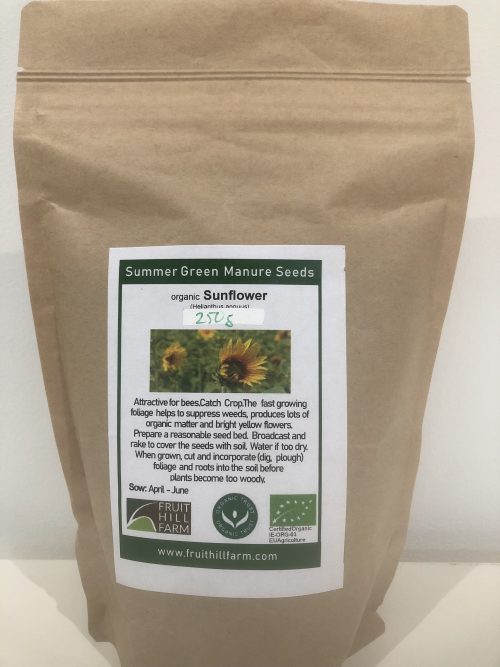
 Hugely attractive for bees. Fast growing foliage which helps supress weeds. Produces lots of organic matter and bright yellow flowers. Prepare a reasonable seed bed . Broadcast and rake to cover the seeds with the soil. When grown, cut and incorporate foliage and roots into the soil before plants become too woody. A great addition to any garden. Sow: April - June 1KG covers 300m²
Hugely attractive for bees. Fast growing foliage which helps supress weeds. Produces lots of organic matter and bright yellow flowers. Prepare a reasonable seed bed . Broadcast and rake to cover the seeds with the soil. When grown, cut and incorporate foliage and roots into the soil before plants become too woody. A great addition to any garden. Sow: April - June 1KG covers 300m² -
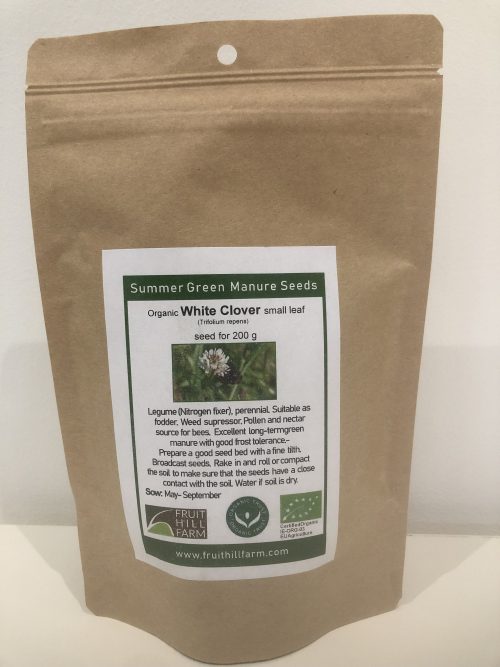 Best used for under sowing with tall crops. Fixes nitrogen, pest management, forage, small leaf. Very good for bees. Long-term green manure. 200g bag. 1KG covers 400-800m²
Best used for under sowing with tall crops. Fixes nitrogen, pest management, forage, small leaf. Very good for bees. Long-term green manure. 200g bag. 1KG covers 400-800m² -
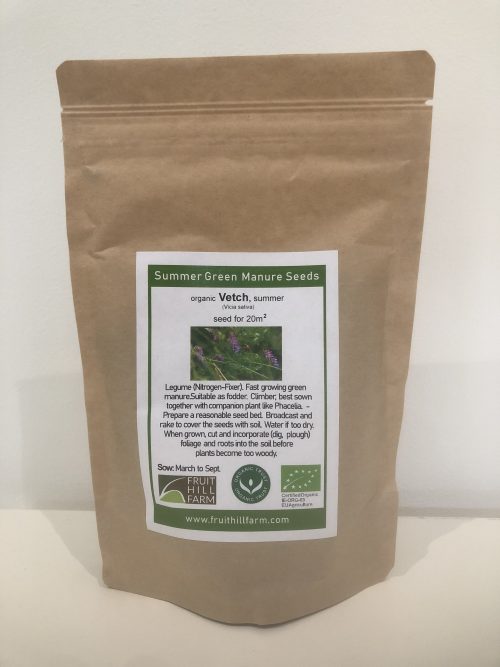 Fast growing green manure. Suitable as fodder. Climber, best sown together with a companion plant like Phacelia. Prepare reasonable seed bed . Broadcast and rake over seeds with soil. When grown, cut and and incorporate foliage and roots into the soil before plants become too woody. Sow March - September 1KG covers 100m²
Fast growing green manure. Suitable as fodder. Climber, best sown together with a companion plant like Phacelia. Prepare reasonable seed bed . Broadcast and rake over seeds with soil. When grown, cut and and incorporate foliage and roots into the soil before plants become too woody. Sow March - September 1KG covers 100m² -
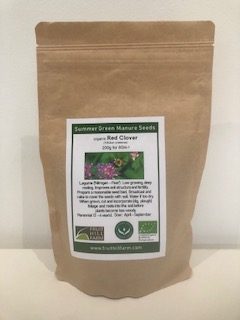 Nitrogen Fixer. low growing, deep rooting. Improves soil structure and fertility. Prepare a reasonable seed bed. Broadcast and rake to cover the seeds with soil. When grown, cut and incorporate foliage and roots into the soil before plants become too woody. Perennial 3-4 years . Sow April - September 1KG covers 400m²
Nitrogen Fixer. low growing, deep rooting. Improves soil structure and fertility. Prepare a reasonable seed bed. Broadcast and rake to cover the seeds with soil. When grown, cut and incorporate foliage and roots into the soil before plants become too woody. Perennial 3-4 years . Sow April - September 1KG covers 400m² -
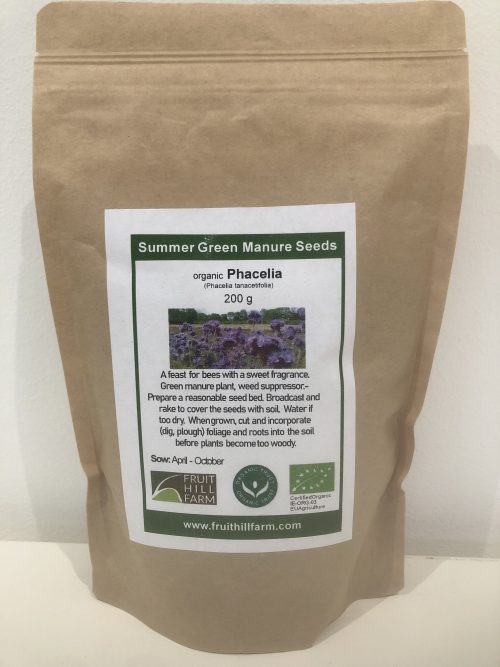 "Tanacetifolia" is a fast growing weed suppressor that is attractive to bees and has impressive blue flowers. Unrelated to other crops. Used as an overwintering crop to protect the soil, or in spring to suppress the weeds. It attracts bees and can be dug straight into the soil before flowering. Sow Mar-Sept. Certified organic. Packs of 200g Can also be used as a green "manure" 1KG covers 600m²
"Tanacetifolia" is a fast growing weed suppressor that is attractive to bees and has impressive blue flowers. Unrelated to other crops. Used as an overwintering crop to protect the soil, or in spring to suppress the weeds. It attracts bees and can be dug straight into the soil before flowering. Sow Mar-Sept. Certified organic. Packs of 200g Can also be used as a green "manure" 1KG covers 600m² -
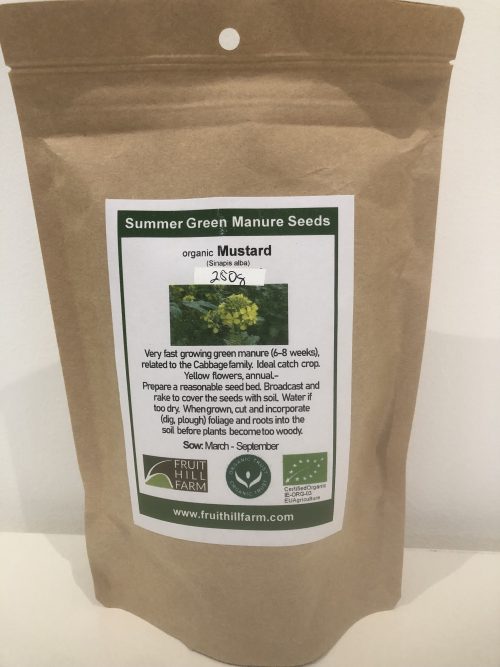 Catch crop,fast growing (6-8weeks) not hardy but robust. Sow months 3-9 Sowing rate /ha: 20-25kg 1kg covers 400m². This pack weighs 250g. Can also be used as a green "manure"
Catch crop,fast growing (6-8weeks) not hardy but robust. Sow months 3-9 Sowing rate /ha: 20-25kg 1kg covers 400m². This pack weighs 250g. Can also be used as a green "manure" -
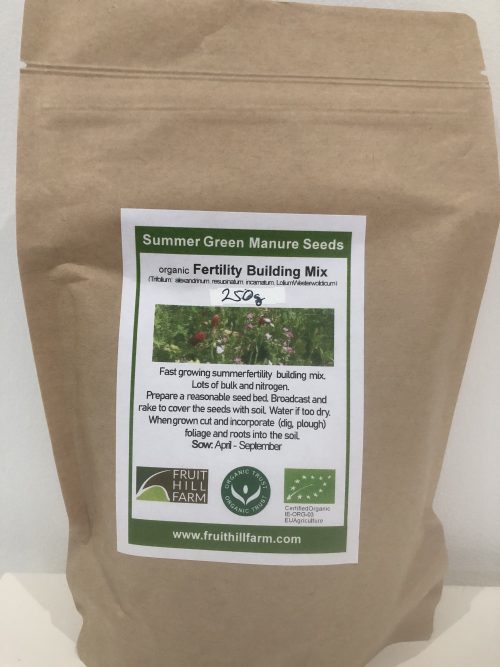 Fast growing summer fertility building mix. Lots of bulk and nitrogen. Prepare a reasonable seed bed. Broadcast and rake to cover the seeds with soil. When grown cut and incorporate foliage and roots into the soil. Sow : April - September 1KG covers 300m²
Fast growing summer fertility building mix. Lots of bulk and nitrogen. Prepare a reasonable seed bed. Broadcast and rake to cover the seeds with soil. When grown cut and incorporate foliage and roots into the soil. Sow : April - September 1KG covers 300m² -
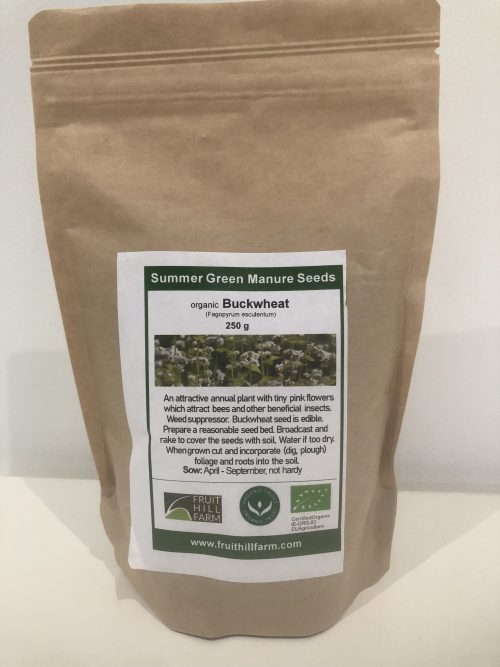 Buckwheat is a fast growing short-term summer green "manure" that germinates in about 3-5 days. This packet contains 250g. 1KG covers 120m²
Buckwheat is a fast growing short-term summer green "manure" that germinates in about 3-5 days. This packet contains 250g. 1KG covers 120m² -
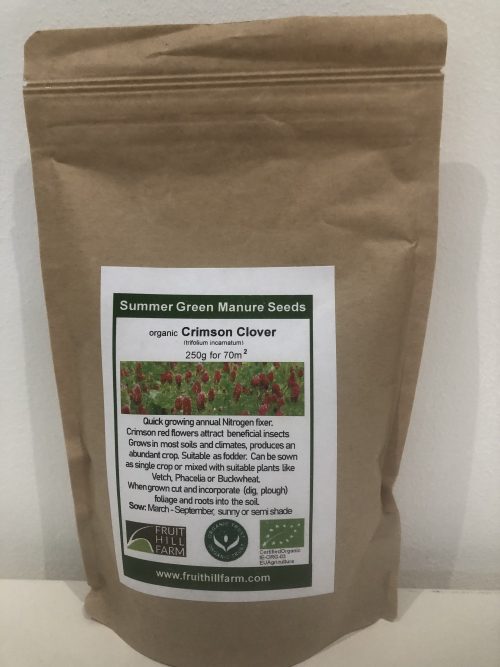 Clover is the best nitrogen fixer of all. It also needs a long growing season. High yielding, forage, great for the bees, improves fertility, deep rooting, and improves soil structure. Can also be used as a green "manure". 1KG covers 300m²
Clover is the best nitrogen fixer of all. It also needs a long growing season. High yielding, forage, great for the bees, improves fertility, deep rooting, and improves soil structure. Can also be used as a green "manure". 1KG covers 300m² -

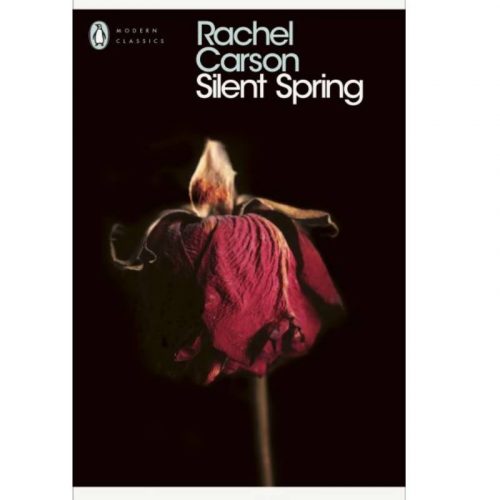 Now recognised as one of the most influential books of the 20th century, Silent Spring exposed the destruction of wildlife through the widespread use of pesticides.
Now recognised as one of the most influential books of the 20th century, Silent Spring exposed the destruction of wildlife through the widespread use of pesticides. -
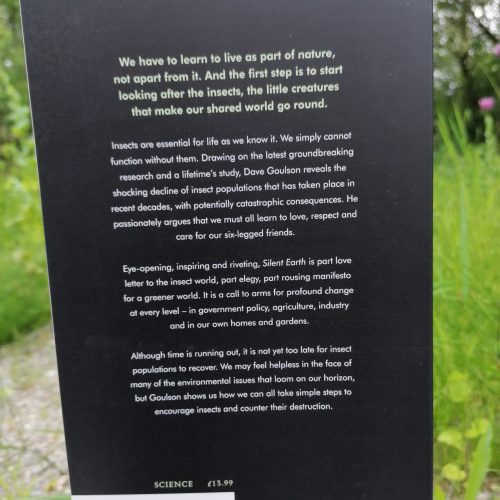
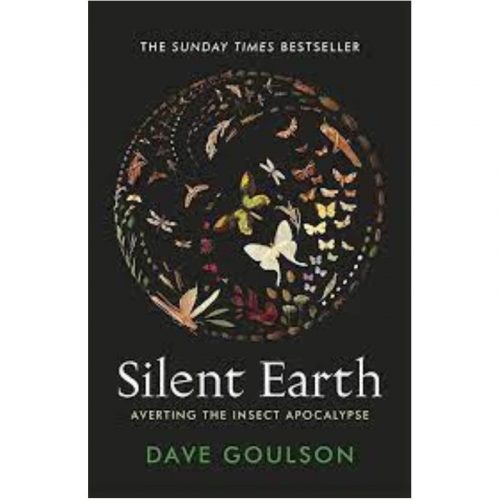
-
Coming Soon
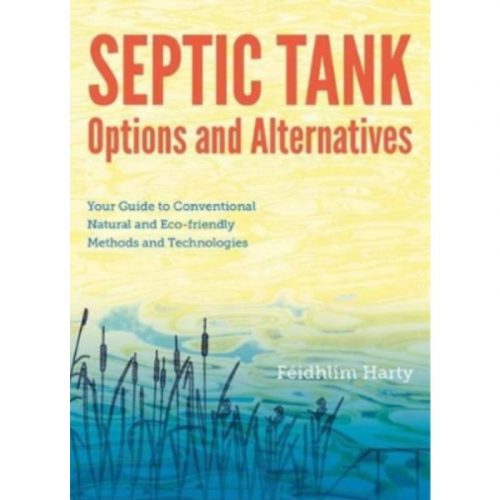 Septic Tank Options & Alternatives is a user-friendly guide through the maze of selecting an eco-friendly sewage treatment option for your home. With so many different treatment systems and technologies available, it can be a challenge to make the choice that really reflects your values and priorities. This book lists conventional and alternative sewage treatment systems and outlines the pros and cons of each in a straightforward and nontechnical way.
Septic Tank Options & Alternatives is a user-friendly guide through the maze of selecting an eco-friendly sewage treatment option for your home. With so many different treatment systems and technologies available, it can be a challenge to make the choice that really reflects your values and priorities. This book lists conventional and alternative sewage treatment systems and outlines the pros and cons of each in a straightforward and nontechnical way. -
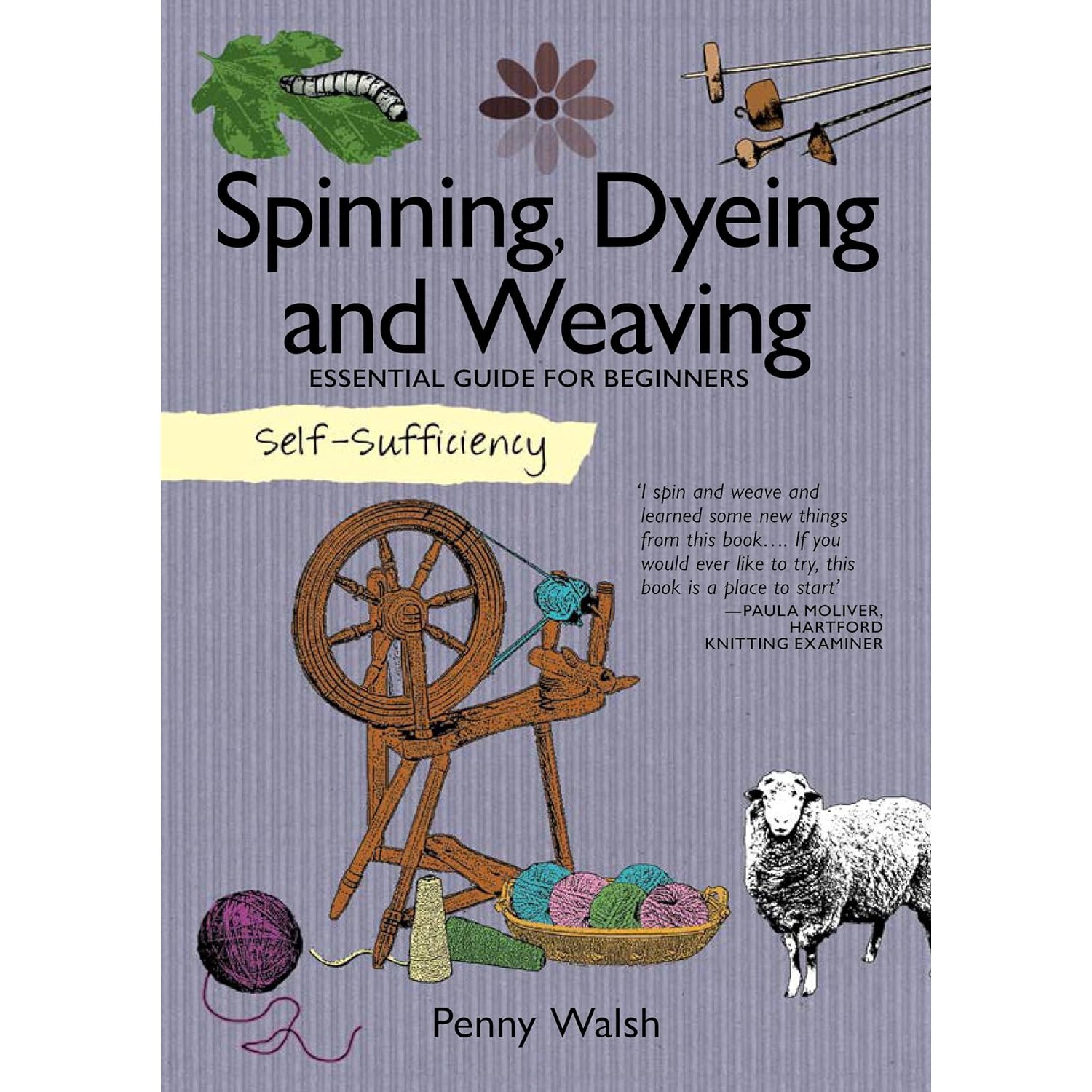 Learn how to make your own homegrown natural fabrics to spin, dye, and weave, with this comprehensive guide! Inside this book, expert textile arts instructor Penny Walsh reveals everything you need to know to start making your own high-quality custom fabrics. Learn where different fibres come from, how to grow and harvest your own animal or vegetable fibres, and how to prepare them for spinning. The principles of spindle and spinning wheel spinning are covered, along with home dyeing using natural dyestuffs you can grow yourself, and hand weaving with or without a loom. Four simple projects—a rug, cushion cover, scarf, and hat—are provided to help you put your newly learned skills to the test. With the mighty textile industry able to produce cloth more quickly than ever before, and stores selling furnishing and clothing textiles in every town centre, why engage in the labour-intensive and time-consuming process of making your own textiles? The answer is a desire for self-sufficiency! Nothing could be more different from modern factory-made cloth than creating your own unique handmade textiles. Although manufactured textiles employ some of the most sophisticated techniques of any modern industry, using huge quantities of energy and creating waste and pollution, the entire fabric production method can be done by hand at home, using almost no energy but your own. If you want to learn how to be fully self-sufficient in making your own textiles, this book will show you how.
Learn how to make your own homegrown natural fabrics to spin, dye, and weave, with this comprehensive guide! Inside this book, expert textile arts instructor Penny Walsh reveals everything you need to know to start making your own high-quality custom fabrics. Learn where different fibres come from, how to grow and harvest your own animal or vegetable fibres, and how to prepare them for spinning. The principles of spindle and spinning wheel spinning are covered, along with home dyeing using natural dyestuffs you can grow yourself, and hand weaving with or without a loom. Four simple projects—a rug, cushion cover, scarf, and hat—are provided to help you put your newly learned skills to the test. With the mighty textile industry able to produce cloth more quickly than ever before, and stores selling furnishing and clothing textiles in every town centre, why engage in the labour-intensive and time-consuming process of making your own textiles? The answer is a desire for self-sufficiency! Nothing could be more different from modern factory-made cloth than creating your own unique handmade textiles. Although manufactured textiles employ some of the most sophisticated techniques of any modern industry, using huge quantities of energy and creating waste and pollution, the entire fabric production method can be done by hand at home, using almost no energy but your own. If you want to learn how to be fully self-sufficient in making your own textiles, this book will show you how. -
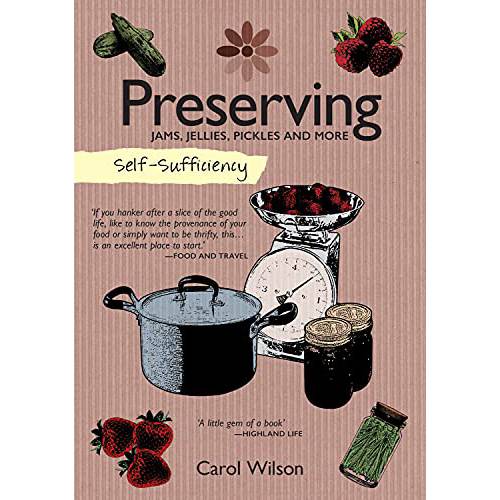 More and more consumers are seeking a healthier, greener, and more self-reliant lifestyle. There is also a growing movement of people interested in quality, handcrafted, local products. These introductory handbooks for the fast-growing self-sufficiency movement are now being published in paperback for the first time, at a lower, attractive price point. They offer accessible, practical advice on what to do, how to do it better, and how to save money.This book, your one-stop guide to successful preserving, contains information on ingredients, popular fruits and vegetables, sugars and cooking techniques, along with storage information and helpful hints and tips, followed by 60 delicious recipes.
More and more consumers are seeking a healthier, greener, and more self-reliant lifestyle. There is also a growing movement of people interested in quality, handcrafted, local products. These introductory handbooks for the fast-growing self-sufficiency movement are now being published in paperback for the first time, at a lower, attractive price point. They offer accessible, practical advice on what to do, how to do it better, and how to save money.This book, your one-stop guide to successful preserving, contains information on ingredients, popular fruits and vegetables, sugars and cooking techniques, along with storage information and helpful hints and tips, followed by 60 delicious recipes. -
 Welcome to the world of safer, greener household cleaning. This friendly book will help you become more self-sufficient and benefit your health, the environment, and your bank balance. Natural Household Cleaning is packed with clear, easy-to-follow cleaning recipes to replace common commercial cleaning products with natural alternatives. You may be pleasantly surprised to discover that your kitchen cupboard already contains many harmless options for transforming your home into a clean and fresh-smelling haven. Lemons, salt, vinegar, baking soda, and club soda are just some of the natural ingredients that can be used to clean the kitchen, bathroom, bedroom, floors, and everything in between. Many of us don't realize just how easy it is to make your own cleaning products and achieve truly amazing results. Turn a chore into a pleasure and discover a whole new way to clean!
Welcome to the world of safer, greener household cleaning. This friendly book will help you become more self-sufficient and benefit your health, the environment, and your bank balance. Natural Household Cleaning is packed with clear, easy-to-follow cleaning recipes to replace common commercial cleaning products with natural alternatives. You may be pleasantly surprised to discover that your kitchen cupboard already contains many harmless options for transforming your home into a clean and fresh-smelling haven. Lemons, salt, vinegar, baking soda, and club soda are just some of the natural ingredients that can be used to clean the kitchen, bathroom, bedroom, floors, and everything in between. Many of us don't realize just how easy it is to make your own cleaning products and achieve truly amazing results. Turn a chore into a pleasure and discover a whole new way to clean! -
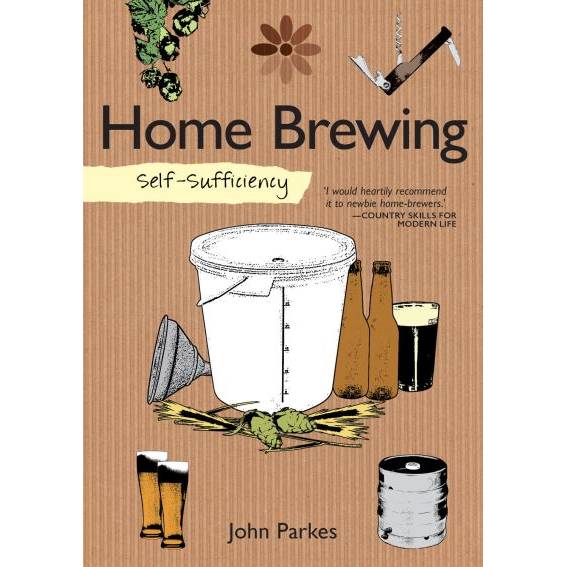 More and more consumers are seeking a healthier, greener, and more self-reliant lifestyle. There is also a growing movement of people interested in quality, handcrafted, local products. These introductory handbooks for the fast-growing self-sufficiency movement are now being published in paperback for the first time, at a lower, attractive price point. They offer accessible, practical advice on what to do, how to do it better, and how to save money. In this timely book, John Parkes demystifies the brewing process and explains in easy-to-follow terms how anyone can produce delicious beer with the help of just some basic equipment and a few key skills. Those new to home brewing will love the easy-to-follow instructions and the detailed explanations of the brewing process and anyone already adept at home brewing will be delighted by the original recipes. Made without unnecessary chemicals and additives, the beers featured here will appeal to anyone seeking a more self-sufficient lifestyle.
More and more consumers are seeking a healthier, greener, and more self-reliant lifestyle. There is also a growing movement of people interested in quality, handcrafted, local products. These introductory handbooks for the fast-growing self-sufficiency movement are now being published in paperback for the first time, at a lower, attractive price point. They offer accessible, practical advice on what to do, how to do it better, and how to save money. In this timely book, John Parkes demystifies the brewing process and explains in easy-to-follow terms how anyone can produce delicious beer with the help of just some basic equipment and a few key skills. Those new to home brewing will love the easy-to-follow instructions and the detailed explanations of the brewing process and anyone already adept at home brewing will be delighted by the original recipes. Made without unnecessary chemicals and additives, the beers featured here will appeal to anyone seeking a more self-sufficient lifestyle. -
Coming Soon
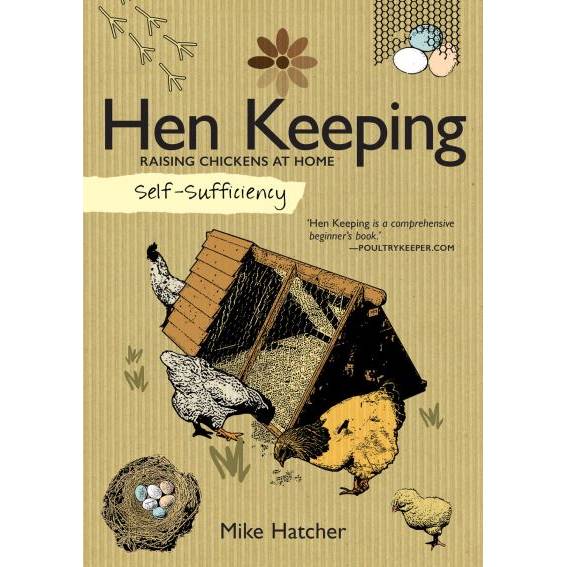 More and more people are becoming concerned about living a healthier land more environmentally-friendly lifestyle. Whether it's moving to the country and starting over on a whim or just making city-living a little simpler and easier, the "green" movement is changing the way people live their day-to-day lives. Self-Sufficiency handbooks are meant to help-offering advice on what to do, how to do it better, and how to save money as well. Hen keeping is becoming an increasingly popular component of the self-sufficient lifestyle. This authoritative handbook provides an introduction to the key aspects of raising chickens.
More and more people are becoming concerned about living a healthier land more environmentally-friendly lifestyle. Whether it's moving to the country and starting over on a whim or just making city-living a little simpler and easier, the "green" movement is changing the way people live their day-to-day lives. Self-Sufficiency handbooks are meant to help-offering advice on what to do, how to do it better, and how to save money as well. Hen keeping is becoming an increasingly popular component of the self-sufficient lifestyle. This authoritative handbook provides an introduction to the key aspects of raising chickens. -
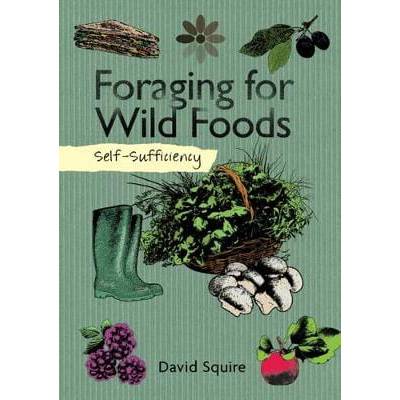 Arranged in a directory of categories divided into wild plants, herbs, fruits, nuts, mushrooms, seaweeds and shellfish, this book has all of the information you need to forage for yourself. You'd be surprised at the bounty of wild food you can find practically on your doorstep: some native plants, some escapes from ancient gardens and all delicious. Most of these foods are within easy reach - however, you've got to know what you're looking for and where to go and when. Clear illustrations to help you identify a wholesome and natural food store, all for free. Hints on how to prepare and eat your foraged bounty are also included, along with advice on seasonality.
Arranged in a directory of categories divided into wild plants, herbs, fruits, nuts, mushrooms, seaweeds and shellfish, this book has all of the information you need to forage for yourself. You'd be surprised at the bounty of wild food you can find practically on your doorstep: some native plants, some escapes from ancient gardens and all delicious. Most of these foods are within easy reach - however, you've got to know what you're looking for and where to go and when. Clear illustrations to help you identify a wholesome and natural food store, all for free. Hints on how to prepare and eat your foraged bounty are also included, along with advice on seasonality. -
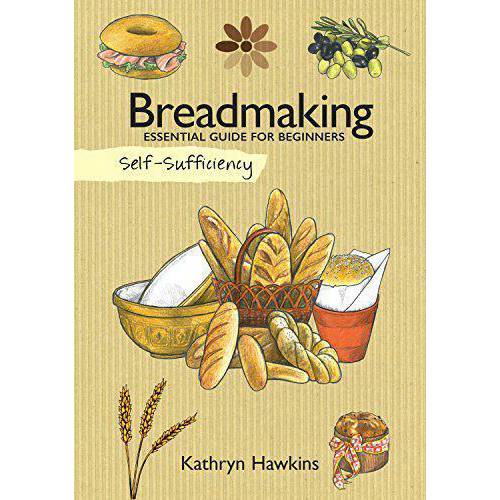 More and more consumers are seeking a healthier, greener, and more self-reliant lifestyle. There is also a growing movement of people interested in quality, handcrafted, local products. These introductory handbooks for the fast-growing self-sufficiency movement are now being published in paperback for the first time, at a lower, attractive price point. They offer accessible, practical advice on what to do, how to do it better, and how to save money. Food writer and culinary stylist Kathryn Hawkins covers all the basics readers need to start baking bread, including essential ingredients and their role in bread making, useful equipment, basic techniques, and 40 delicious recipes.
More and more consumers are seeking a healthier, greener, and more self-reliant lifestyle. There is also a growing movement of people interested in quality, handcrafted, local products. These introductory handbooks for the fast-growing self-sufficiency movement are now being published in paperback for the first time, at a lower, attractive price point. They offer accessible, practical advice on what to do, how to do it better, and how to save money. Food writer and culinary stylist Kathryn Hawkins covers all the basics readers need to start baking bread, including essential ingredients and their role in bread making, useful equipment, basic techniques, and 40 delicious recipes. -
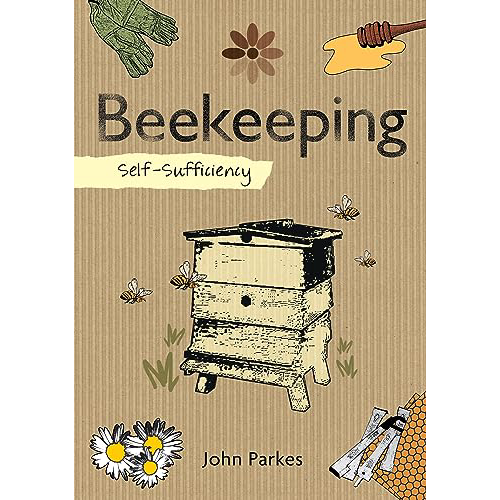
 As sustainability and organic living become increasingly popular, so does a desire to live a more self-sufficient lifestyle. This timely book will help you to achieve self-sufficiency and make beekeeping a reality. Beekeeping is about management, control and learning to understand the honeybee. It can also become a very enjoyable and sociable pastime - visiting others' hives and picking up vital hints and tips is all part of the fun - and farming and eating honey that your own bees have produced is a pure delight. Joanna Ryde covers all aspects of beekeeping, from the basic tools and equipment needed for setting up a hive to detailed advice on when to harvest honey and honey-inspired recipes, from delicious cakes to beauty products. This really is the definitive guide for anyone thinking of keeping bees.
As sustainability and organic living become increasingly popular, so does a desire to live a more self-sufficient lifestyle. This timely book will help you to achieve self-sufficiency and make beekeeping a reality. Beekeeping is about management, control and learning to understand the honeybee. It can also become a very enjoyable and sociable pastime - visiting others' hives and picking up vital hints and tips is all part of the fun - and farming and eating honey that your own bees have produced is a pure delight. Joanna Ryde covers all aspects of beekeeping, from the basic tools and equipment needed for setting up a hive to detailed advice on when to harvest honey and honey-inspired recipes, from delicious cakes to beauty products. This really is the definitive guide for anyone thinking of keeping bees. -
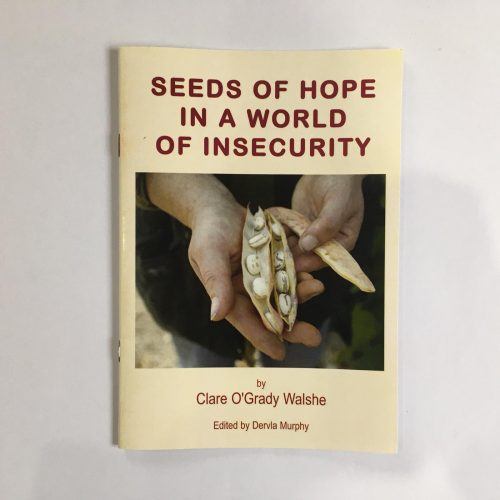 This is a paper written by Clare O'Grady Walshe on how imposing new legislation, in Ireland and overseas, is placing our food sovereignty and security in danger. Reduced to €3 due to slight shop damage (rusty staples).
This is a paper written by Clare O'Grady Walshe on how imposing new legislation, in Ireland and overseas, is placing our food sovereignty and security in danger. Reduced to €3 due to slight shop damage (rusty staples). -
Coming Soon
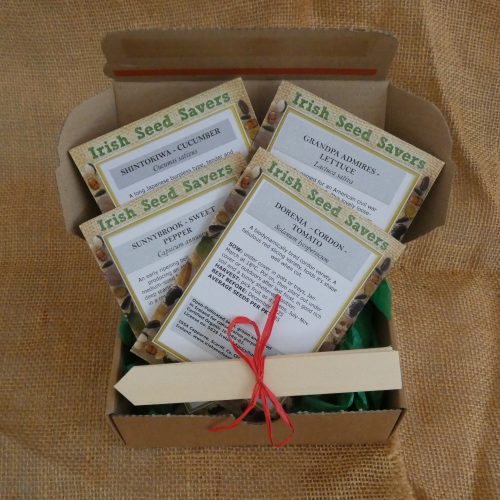
-
Coming Soon
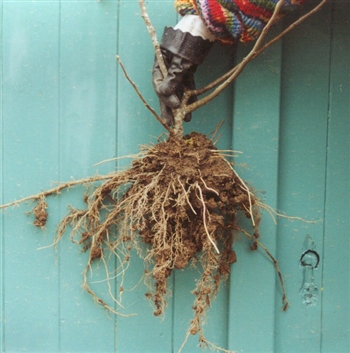
-
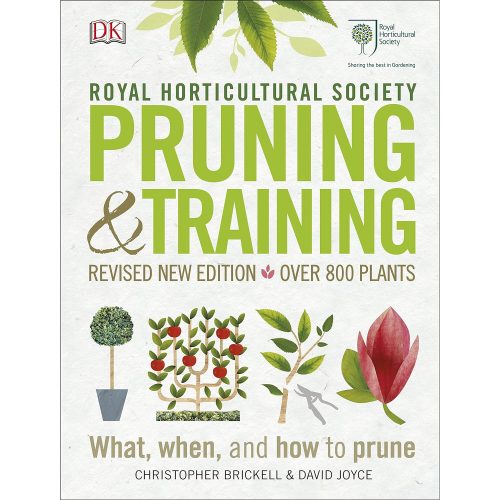 Learn how to prune and train fruit bushes, fruit trees, roses, and woody ornamentals with this best-selling plant-by-plant guide - now in its 4th edition. Written and updated by the experts at the Royal Horticultural Society, RHS Pruning & Training provides step-by-step guidance on how to prune and shape more than 800 different plants, including climbing plants, fruiting vines, conifers, and palm trees. Simple instructions accompanied by clear photography and illustrations demonstrate precisely where, how, and when to make those crucial cuts. Whether you need help pruning wisteria, have a small garden that needs controlling, fancy trying garden ideas such as topiary, need to reinvigorate a leggy rose bush, or want advice on pruning a fruit tree into an attractive - and productive - espalier or fan shape, this complete pruning bible will guide you every step of the way.
Learn how to prune and train fruit bushes, fruit trees, roses, and woody ornamentals with this best-selling plant-by-plant guide - now in its 4th edition. Written and updated by the experts at the Royal Horticultural Society, RHS Pruning & Training provides step-by-step guidance on how to prune and shape more than 800 different plants, including climbing plants, fruiting vines, conifers, and palm trees. Simple instructions accompanied by clear photography and illustrations demonstrate precisely where, how, and when to make those crucial cuts. Whether you need help pruning wisteria, have a small garden that needs controlling, fancy trying garden ideas such as topiary, need to reinvigorate a leggy rose bush, or want advice on pruning a fruit tree into an attractive - and productive - espalier or fan shape, this complete pruning bible will guide you every step of the way. -
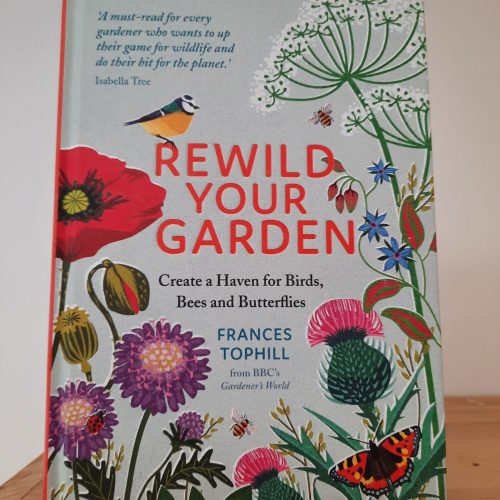
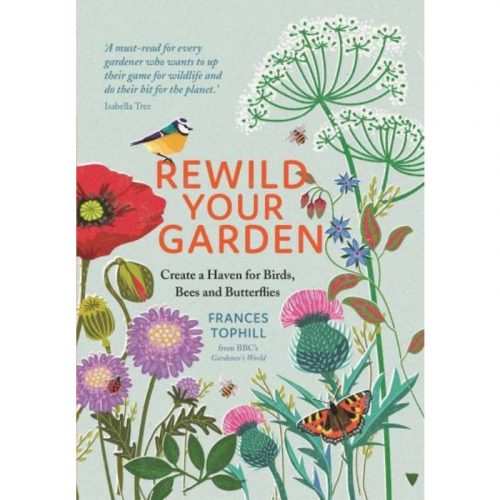
-
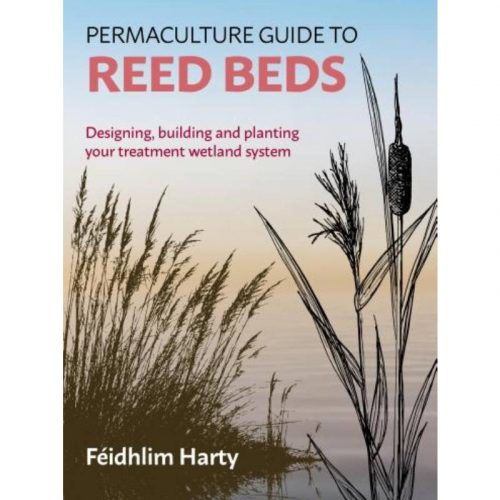 The Permaculture Guide to Reed Beds is a comprehensive overview of reed bed systems and treatment wetlands for household effluent treatment. Going from system selection and design to construction, planting and maintenance; this guide offers the reader a complete how-to manual for getting your own reed bed system up and running.
The Permaculture Guide to Reed Beds is a comprehensive overview of reed bed systems and treatment wetlands for household effluent treatment. Going from system selection and design to construction, planting and maintenance; this guide offers the reader a complete how-to manual for getting your own reed bed system up and running. -
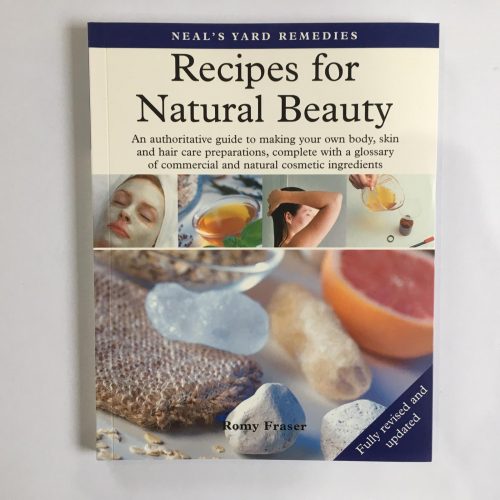 An authoritative guide to making your own body, skin and hair care preparations, complete with a glossary of commercial and natural cosmetic ingredients.
An authoritative guide to making your own body, skin and hair care preparations, complete with a glossary of commercial and natural cosmetic ingredients. -
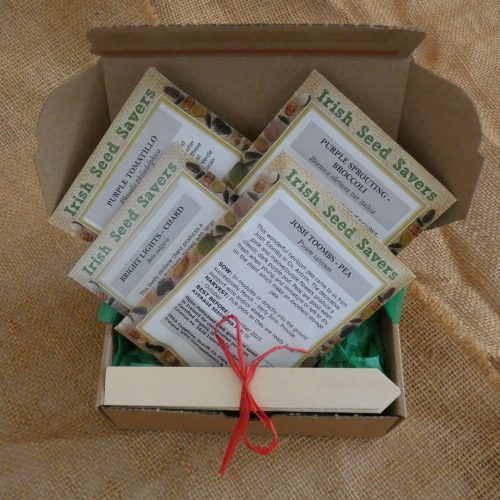
-
Coming Soon
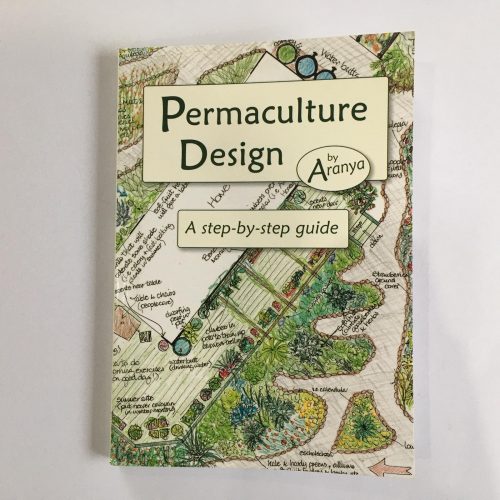 In this unique book Aranya leads you through the design process from beginning to end, using clear explanations, flowcharts and diagrams.
In this unique book Aranya leads you through the design process from beginning to end, using clear explanations, flowcharts and diagrams. -
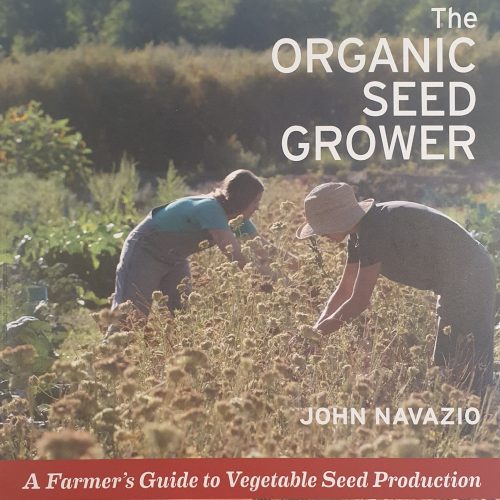 A farmers guide to vegetable seed production by John Navazio
A farmers guide to vegetable seed production by John Navazio -
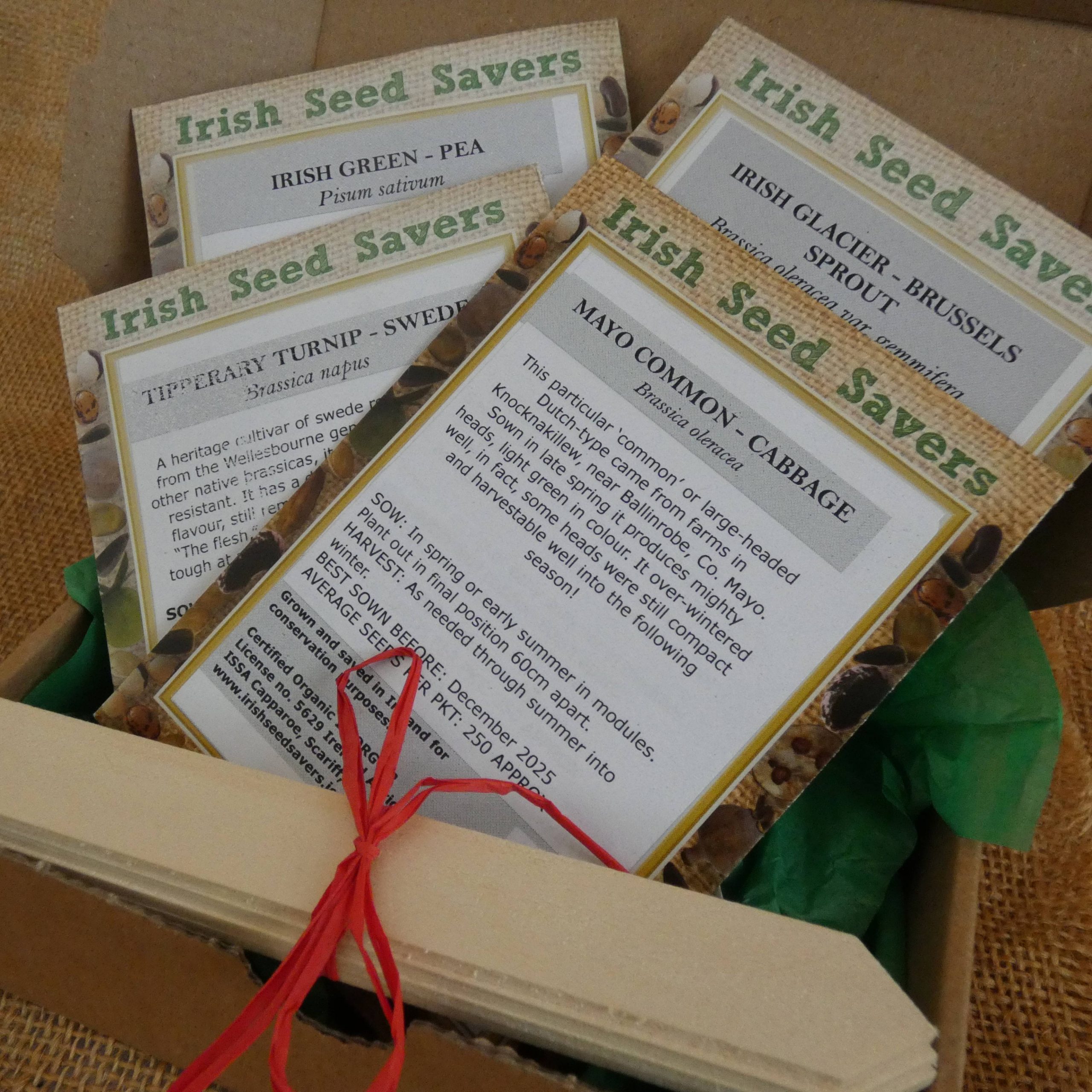

Supported in part by the Department of Rural and Community Development and Pobal through the Community Services Programme. We confirm that our organisation complies with The Governance Code for the Community, Voluntary and Charitable Sector in Ireland.

